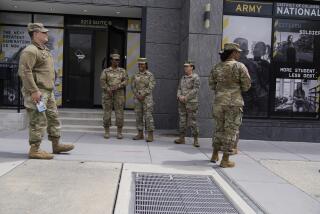National Guard soldiers and airmen face unemployment crisis
For 1st Lt. Ernest Rodriguez, weekly chats with his young daughter via phone or Skype are the highlight of duty in Afghanistan.
The father from Sacramento desperately wants to come home to 7-year-old Samantha. But instead, he has signed up for another year in the war zone. He needs the money and he knows that returning National Guard troops face high unemployment.
More than half of those in his unit had no work when they got back to California in August. Across the country, an estimated 20% of returning National Guard soldiers and airmen are without jobs, former National Guard Bureau Chief Gen. Craig R. McKinley told Congress earlier this year. That is twice the rate for all military veterans who have served since September 2001.
The Obama administration has helped reduce the unemployment rate for all recent veterans, from 15% nearly two years ago to 10% last month, by developing online tools to help returning troops find jobs, working with employers to increase recruitment and retention, and signing into law tax credits for hiring veterans.
But the rate remains stubbornly high for National Guard members and military reservists. Some employers are reluctant to hire them because, unlike other veterans joining the civilian workforce, they can be called up again.
“A person cannot run a company with their most valued asset, their human capital, being taken away for 12 to 18 months at a time,” said Ted Daywalt, president of vetjobs.com, one of the largest Internet job sites for veterans.
No longer just “weekend warriors,” the nation’s more than 1 million National Guard and reserve members have been transformed by the wars in Iraq and Afghanistan into frontline forces. Even as the wars wind down, the troops are being tapped for peacekeeping duties in Africa, Europe and elsewhere. Those in the Guard also have state obligations and can be called to respond to brush fires and other emergencies.
Federal law prohibits employers from discriminating against job applicants because of their military service. But such discrimination can be hard to prove.
Rodriguez, who is 40 and has a college degree, said he submitted hundreds of resumes after he was laid off in 2008 by a Sacramento housing developer.
“As soon as they found out I was in the Guard,” he said, “I got hardly any sort of response from anybody.”
Rodriguez shares custody of Samantha with her mother. By the time he received orders to deploy with the 756th Transportation Company, he had exhausted his unemployment benefits and was worried about putting food on the table. So when a position opened up in another unit in Afghanistan, he grabbed the opportunity.
“I didn’t want to be in the ranks of the deadbeat dads,” he said.
Other service members have returned from deployments to find their former employers out of business or their positions axed. The law generally requires employers to take them back, but not if they would have been let go even if they hadn’t been called up.
Veteran unemployment is highest among the young. Like their active-duty counterparts, many in the Guard enlist out of high school and have little or no work experience before they deploy. The demands on the military have been so high, some have not needed to look for civilian jobs in years.
When Sgt. 1st Class Edward Dueñas got back from Iraq in 2009, many openings existed for Guard and reserve members to step in for departing active-duty soldiers. The 38-year-old father of two said he quickly found work in Washington state preparing other soldiers to deploy until he, too, was mobilized to go to Afghanistan with the 756th.
But he says there are fewer opportunities like that now. He has broadened his search to include law enforcement and security jobs. “I get call-backs, but it’s very competitive,” he said.
His post-deployment leave pay ended in October. He receives unemployment benefits. But even with his wife’s earnings from a store on base, their income has been cut by half.
Although the job market is improving, advocates for veterans fear their employment difficulties will get worse as the U.S. completes its drawdown in Iraq and Afghanistan. The Pentagon estimates as many as 1 million service members will enter the civilian workforce in the next five years.
Guard leadership says unemployment is becoming a force readiness issue. “Soldiers can’t show up if they don’t have a car, if they don’t have gas,” said Maj. Ty Shepard, who heads a state program that aims to slash unemployment in the California National Guard.
1st Lt. Dalia Sanchez, who commands the 756th, also worries about the toll it can take on her soldiers’ financial stability, family relations and mental health.
“I think it exacerbates any reintegration issues they already have,” said Sanchez, a social worker in her civilian career. “It can make depression worse, anxiety worse, sleep problems worse.”
Sgt. 1st Class Timothy King, a military police member from Whittier who deployed with the 756th, said his marriage collapsed because he was away for three of the last six years. But he needed the deployments because he couldn’t find civilian work. Now he is in divorce proceedings and racking up credit card debt while caring for two young children and applying for jobs as a police officer.
“After being on deployment where your adrenaline is high every single day … it’s just hard to sit on your butt all the time and not do anything,” he said. “I don’t feel like much of a man anymore.”
Hoping to head off a crisis, the National Guard in California and other states is taking a more aggressive approach to unemployment.
Under a pilot program launched in late January, members of Shepard’s Work for Warriors program reached out to the 756th to help troops start looking for work two months before they returned to the United States. They created a database with the service histories and educational qualifications of all those in need of employment. And they looked for jobs that would be a good fit.
Trucking and security firms had many openings. But soldiers applying for the slots often struggled to translate military skills into terms a civilian employer could understand, Shepard said. Work for Warriors staff helped them purge their resumes of military jargon and focus on skills that would be useful in the workplace: leadership, discipline, responsibility.
Others had skills they could not use because they lacked civilian credentials, such as commercial driver’s licenses. A new state law will allow troops qualified to drive large military vehicles to obtain the licenses without taking a road test. The California Trucking Assn. has provided vehicles for service members to take the test.
Work for Warriors also lined up training and certification opportunities for Guard members interested in security jobs and will soon begin offering the training itself.
At the same time, Shepard’s office has been working to address any concerns employers have about hiring Guard members. They can even get a soldier excused from training if necessary.
To date, they have helped find work for more than 300 of the 1,789 members who contacted them, he said.
Nearly four months after the return of the 756th, unemployment among the 159 current members stands at 17%. That is slightly higher than for the California National Guard as a whole and five points higher than the state unemployment rate.
The figures don’t include the many Guard members who are using their GI Bill benefits to go to school. Guard leaders had high praise for the program, which includes a small living stipend. But they worry that too many are using the benefit for subsistence rather than to upgrade their educational qualifications.
Unless the economy picks up substantially, Shepard said, they too may soon be joining the ranks of the unemployed.
More to Read
Start your day right
Sign up for Essential California for news, features and recommendations from the L.A. Times and beyond in your inbox six days a week.
You may occasionally receive promotional content from the Los Angeles Times.






